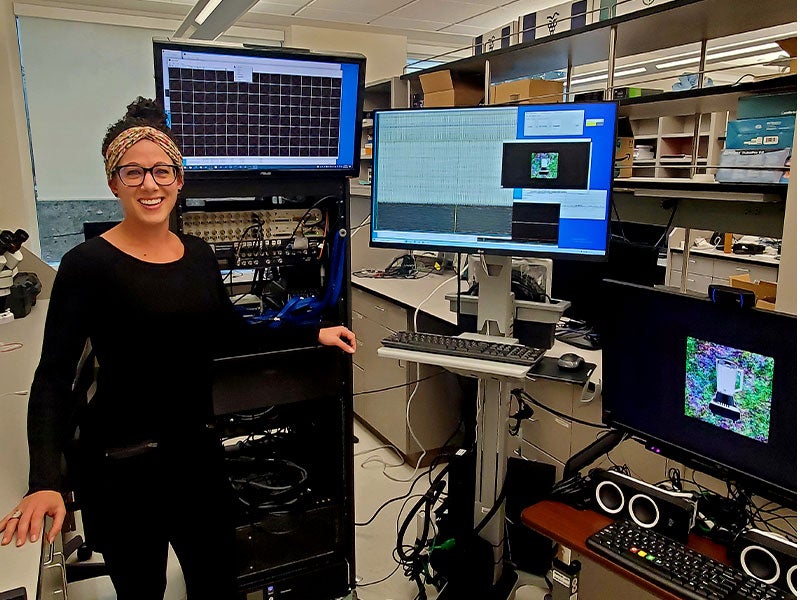Mapping New Frontiers
by Kate Frentzel
As a child, Krista Wahlstrom ’15 wanted to know how things worked. “I was always the kid who asked a million questions about everything,” she remembers.
At Luther, she fell in love with lab-based, hands-on science, focusing her curiosity on biology and psychology. “I became really interested in psychology and cognitive neuroscience,” she says. “When I took a behavioral psychology course offered by professor Kristy Gould, I became really interested in the brain in particular.”
Wahlstrom earned a PhD in neuroscience at the University of Iowa, where she worked in the lab of Ryan LaLumiere researching learning and memory. She looked specifically at the role of the amygdala in forming long-lasting memories. “It’s known to be at the center or the hub of various memory networks in the brain,” she says. “I was interested in how that brain region and its connections to other regions help facilitate different types of memory.”

Krista Wahlstrom '15 stands with equipment she uses for neural recordings and memory tasks.
To study this, Wahlstrom used optogenetics—a technique to turn on or off different parts of the brain using light—to figure out if the amygdala and its pathways are important for memory formation in a rodent model. Her research, for which she earned a National Institutes of Health National Research Service Award, was groundbreaking. She mapped two previously uncharted pathways from the amygdala to other areas of the brain that are important for spatial memory (using landmarks to navigate) and cued memory (based on specific environmental cues, like words or symbols).
“I was able to figure out that the amygdala can influence these different types of memories and either enhance or impair them by way of its projections to very distinct brain regions,” she explains.
As a postdoctoral fellow in Cory Inman’s lab at the University of Utah, Wahlstrom continues her memory research, this time in humans. She uses direct electrical stimulation of the amygdala to interrogate its role in memory for scenes compared to objects. Her work could have major bearing on treatment for patients with memory-related disorders, like Alzheimer’s Disease or PTSD.
Of course, with so much still unknown about the human brain, it’s hard to predict exactly where Wahlstrom’s research will go or what she’ll discover. As a lifelong space enthusiast who plans to apply for the NASA astronaut program to conduct research at the International Space Station, that’s pretty exciting to her.
“Space is the final frontier of human exploration, and I feel that maps directly onto the human brain as being this kind of final frontier of exploring the human experience,” she says. Lucky for the rest of us, Wahlstrom’s exploration already pushes knowledge forward and stands a good chance of improving future human lives.